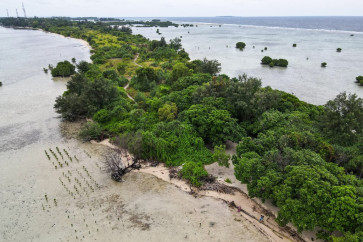Insight: A new footing: Finding Indonesia’s post-COVID-19 strategic focus
Indonesia, as ASEAN’s natural leader, seems somewhat disconnected with current regional issues
Change Size

I
span>Indonesia, as ASEAN’s natural leader, seems somewhat disconnected with current regional issues. As it focuses on the health crisis, Indonesia seems to have no appetite for opening a new diplomatic “battlefront”. With the South China Sea issue, it seems ASEAN does not have the vigor to confront China directly for its actions in the South China Sea.
The public health crisis has caused the grouping to lean more toward China for assistance in combating COVID-19 – amid an apparent “wait and see” approach for the Indonesian Foreign Ministry in reacting to international issues. Hence, a new footing must be found to accommodate Indonesia’s strategic focus in a post-COVID-19 world.
The governing principle of Indonesia’s foreign policy was ascribed in the aftermath of independence from the Netherlands. Under this policy, Indonesia forbids itself from entering into alliances with other sovereign nations. This is to prevent a loss of sovereignty, which could be exercised by its alliance partners in matters of defense and security.
The free and active foreign policy dictates that Indonesia’s course in international relations must be calibrated with the objectives within the Constitution – mainly to eradicate colonialism, and to promote and uphold “state sovereignty, peace and social justice”.
Indonesia’s 75-year-old history shows a very pragmatic foreign policy. In seeking to respect the sovereignty of other independent states, Indonesia does not – or perhaps cannot – differentiate between supporting authoritarian states or legitimate democracies. Emphasis on “non-interference” has somewhat clouded the state’s judgment to weigh in on human rights violations.
With its elected position within the United Nations Human Rights Council (UNHRC) from 2020 to 2022, Indonesia could now press upon domestic and international human rights violations.
If foreign policy is an extension of domestic policy, Jakarta should do whatever it takes to preserve its integrity by improving human rights, not only in volatile areas such as Papua, but also in other urban and rural areas.
Moreover, Indonesia should resume talks with Myanmar and Bangladesh to bring a workable solution to the Rohingya issue. Last is Indonesia’s position on ethnic Uighurs in China. It is palpable that Indonesia does not want to lose out on the economic benefits by singling out China. However, a pick-and-mix policy on human rights would show Indonesia’s hollow contribution within the UNHRC.
Bilateral relations with China have been managed intricately to avoid any political incidents. This stems from the volatile history between both countries, which saw the freezing of diplomatic relations throughout most of Soeharto’s New Order and discrimination against Chinese-Indonesians, particularly during the 1998 riots.
Therefore, Indonesia has traversed a fine line to maintain a positive diplomatic relationship with China, but at the cost of its moral discipline. Indonesia’s pragmatic policy toward China, and to the world, has led to a more hands-off approach on matters regarding China. Despite its claim to be a non-claimant in the South China Sea, for instance, Indonesia still attracts a number of incidents stemming from Chinese sovereignty violations.
Yet, Jakarta seems to prefer to solve these incidents surreptitiously. Jakarta’s intention to preserve the status quo between itself and Beijing only led to further deterioration of ASEAN’s unity, at the cost of its own advancement. Such behavior requires urgent redress to better align Indonesia’s strategic footing in the future.
During Susilo Bambang Yudhoyono’s second administration, the former president announced that Indonesia’s strategic outlook would be that of “having a million friends and zero enemies”. Such outlook fits very well with Indonesia’s core interest of non-intervention and opposition to external attempts to meddle in internal affairs. This outlook managed to elevate Indonesia’s international prominence, such as its inclusion within the Group of 20 and co-chairing the UN high-level panel on the post-2015 Millennium Development Goals.
Meanwhile, President Joko “Jokowi” Widodo, with his penchant for domestic reforms, has sought to “bring diplomacy back to earth” by emphasizing economic gains and the protection of Indonesians and Indonesian businesses overseas.
This, coupled with the Global Maritime Fulcrum, envisioned Indonesia as the core axis for global trade and manufactory. As such, Indonesia corresponds well with economic incentives from various states, mainly China’s Belt and Road Initiative.
Although the government claims it equally evaluates all economic incentives, Jokowi’s, or perhaps his administration’s, admiration for China is palpable. Much of this is attributed to Coordinating Maritime Affairs and Investment Minister Luhut Pandjaitan.
Yet, there seems to be a minimal shift from Yudhoyono’s strategic focus to Jokowi’s. Both still put forward non-interference, a disregard for human rights and non-alignment. Jokowi’s preference for economic advancement has sidelined values like transparency and freedom of expression. The government has instead chosen nationalistic ideas, even in foreign policy.
This has led Indonesia to pursue relationships with states of “shared destiny”, whereby Jakarta will act in an obsequious way to countries that have promised to share their richness with Indonesia.
Following the pandemic, Jakarta must start to get its strategic focus in order. Jokowi’s “down-to-earth diplomacy” has shown the state’s immense deficiency in mitigating the crisis. Pursuing a “shared destiny” with a main trading partner has contributed to the loss of hundreds of lives, as such focus has had no direct benefit toward education, health or research and development. The way forward is to start shifting toward workable shared values with like-minded partners – or we will become no different than the authoritarian states that we have bootlicked to gain their favor.
____________
Researcher, Department of International Relations, CSIS Indonesia. This is an abridged version from the original article published in CSIS Commentaries









